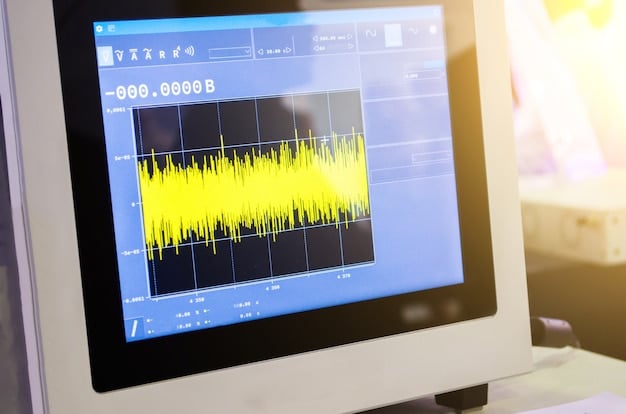Podcast Editing Software: Save 20% More Time in 2025!

Podcast editing software is evolving rapidly, with AI-powered features promising to save podcasters up to 20% more time in 2025 by automating tedious tasks, improving audio quality, and streamlining the overall editing workflow.
Are you a podcaster looking to reclaim valuable time while producing high-quality content? The landscape of podcast editing software: which platform will save you 20% more time in 2025? is rapidly evolving, driven by advancements in artificial intelligence and automation. These tools are designed to streamline your workflow, allowing you to focus on what truly matters: creating engaging content.
The Evolving Landscape of Podcast Editing Software
The world of podcasting is becoming increasingly competitive, making efficiency more critical than ever. Podcast editing software is no longer just about cutting and splicing audio; it’s about leveraging technology to save time and enhance the overall listening experience.
As we look ahead to 2025, the integration of AI is set to revolutionize how podcasts are edited. With the right tools, podcasters can realistically expect to save a significant chunk of their editing time, potentially up to 20%, freeing them to focus on content creation and audience engagement.
The Rise of AI-Powered Editing
AI is transforming various aspects of podcasting, but its impact on editing is particularly profound. AI-driven features are automating tasks that were once time-consuming and labor-intensive.
- Automatic Noise Reduction: AI algorithms can intelligently identify and remove background noise, hums, and other distractions, resulting in cleaner, more professional-sounding audio.
- Smart Audio Leveling: Eliminates the need for manual gain adjustments by automatically normalizing audio levels across different segments of your podcast.
- Automated Transcription: Quickly converts audio into text, saving hours of manual transcription and providing valuable content for show notes and accessibility.
- Content Repurposing: Allows you to use short-form content from your podcast on various social media platforms.
By automating these tasks, AI-powered software empowers podcasters to produce high-quality content more efficiently, making it a game-changer for both beginners and seasoned professionals.

In conclusion, the shift towards AI in podcast editing is not just a trend; it’s a fundamental change that will reshape how podcasts are created and consumed. By embracing these technologies, podcasters can unlock new levels of efficiency and creativity.
Key Features to Look for in 2025
As you evaluate podcast editing software for 2025, keep an eye out for specific features that can significantly impact your workflow and save you time. These features are beyond basic editing tools and represent the cutting edge of podcasting technology.
- Advanced AI Noise Reduction: Goes beyond basic noise reduction to intelligently identify and remove specific types of noise, such as echo, reverb, and mouth clicks.
- Multi-track Editing: Essential for podcasts with interviews, music, or sound effects, allowing you to manipulate each audio track separately.
- Non-Destructive Editing: Ensures that your original audio files remain untouched, allowing you to experiment without fear of irreversible changes.
- Integration with Podcast Hosting Platforms: Simplifies the publishing process by seamlessly transferring your edited audio to your chosen hosting platform.
Beyond specific features, consider the overall user experience. The software should be intuitive and easy to learn, even if you’re not a tech expert. A well-designed interface can save you time and frustration in the long run.
Collaboration and Remote Editing
The ability to collaborate with others is becoming increasingly important in podcasting. Look for software that supports remote editing and collaboration, allowing you to work with team members regardless of their location.
Effective podcasting is a collaborative effort, and the right tools can foster a seamless workflow. Whether you are working with co-hosts, guest, or an entire team, a collaborative feature is essential.
In conclusion, selecting the right podcast editing software in 2025 will depend on your specific needs and priorities. However, by focusing on key features like AI-powered tools, multi-track editing, and ease of use, you can find a platform that saves you time and helps you create exceptional content.
Top Podcast Editing Software Options for 2025
With so many options available, choosing the right podcast editing software can be overwhelming. Here are a few of the top contenders for saving you time in 2025:
These software options excel in terms of AI integration, user-friendliness, and advanced features that lead to time-saving workflows. Many new types of podcasting software are coming into the market, changing everyday.
- Adobe Audition: Industry-standard software with powerful editing tools and seamless integration with other Adobe Creative Cloud applications.
- Descript: A unique platform that combines audio and video editing with transcription, making it easy to edit your podcast by editing the text.
- Alitu: Specifically designed for podcasters, offering a simplified interface and automated features like intro/outro addition and audio leveling.
- Logic Pro X: A professional-grade digital audio workstation (DAW) with a comprehensive set of editing tools and effects.

Ultimately, the best software for you will depend on your individual needs and preferences. Consider factors like your budget, technical expertise, and the complexity of your podcast when making your decision.
Cost Considerations and ROI
Investing in podcast editing software is an investment in your podcast’s success. However, it’s important to consider the cost and potential return on investment (ROI).
Free software might seem appealing, but it often lacks the advanced features and support you need to save time and produce high-quality audio. Paid software typically offers a wider range of tools, better performance, and dedicated customer support.
Calculating Your Potential Savings
To determine the ROI of podcast editing software, calculate how much time you currently spend editing each episode. Then, estimate how much time the software could save you based on its features and automation capabilities.
After you find an estimate, find the pricing of the software you are interested in, and see if it will save you less time. Remember to include everything like equipment and additional items required for the podcast.
Consider how your free time can improve other areas of your podcasting, such as marketing, content creation and more. Investing in yourself is a great way to yield great results later.
By carefully evaluating the cost and potential time savings, you can make an informed decision about which podcast editing software offers the best value for your money.
Future Trends and Predictions
The field of podcast editing software is constantly evolving, and several trends are likely to shape its future in the years to come.
Predictions are sometimes wrong of course, but it’s always a good idea to consider how the future may be.
- Enhanced AI Capabilities: AI will continue to play a more significant role in podcast editing, automating even more tasks and providing more intelligent assistance.
- Cloud-Based Editing: Cloud-based platforms will become more prevalent, allowing podcasters to edit their audio from anywhere with an internet connection.
- Improved Collaboration Tools: Software will offer even more robust collaboration features, making it easier for teams to work together on podcasts remotely.
- Personalized Editing Experiences: Software will adapt to your individual editing style and preferences, providing a more customized and efficient workflow.
Staying informed about these trends can help you choose software that will remain relevant and effective in the long term. Embracing innovation today can ensure you stay ahead of the curve and continue to produce engaging, high-quality podcasts.
Tips for Maximizing Efficiency
Even the most advanced podcast editing software won’t save you time if you don’t use it effectively. Here are some tips for maximizing your efficiency:
Sometimes the software may not be the problem itself. Having a smooth workflow combined with software might be the key to becoming the best editor possible.
- Learn the Software’s Shortcuts: Mastering keyboard shortcuts can significantly speed up your editing process.
- Create a Consistent Workflow: Developing a repeatable workflow can minimize errors and ensure consistency across your episodes.
- Use Templates and Presets: Save time by creating templates for common editing tasks and using presets for effects and audio settings.
- Practice Regularly: The more you use the software, the more proficient you’ll become, and the faster you’ll be able to edit your podcasts.
One key element for efficiency is to remove all distractions and create a productive environment. That can include everything from a quiet space to avoiding notifications. Also remember that taking breaks is okay, and should be done.
| Key Point | Brief Description |
|---|---|
| 🤖 AI Integration | AI-powered features automate noise reduction, leveling, and transcription. |
| ⏱️ Time Savings | Software aims to save podcasters up to 20% more time in 2025. |
| 💸 Cost vs. ROI | Weigh the software cost against the potential time and money saved. |
| ✨ User Experience | Choose software that has an interface that is friendly. |
FAQ
▼
The most important feature often depends on your specific needs, but AI-powered noise reduction is crucial for enhancing audio quality and saving time on manual cleanup.
▼
Yes, but only to a certain degree. Many of the free software options available lack advanced features and lack support. For serious podcasters, paid software is recommended.
▼
Alitu is often recommended for beginners due to its simplified interface and automated features, making it easy to create professional-sounding podcasts without extensive technical knowledge.
▼
As we approach 2025, podcasters can expect to save up to 20% more time, by using AI, through features such as automated transcription, leveling and noise deduction.
▼
Adobe Audition and Descript stand out as leading contenders, offering powerful editing tools and innovative features. The best will depend on your individual needs.
Conclusion
As we advance towards 2025, the landscape of podcast editing software is becoming increasingly sophisticated, driven by the power of AI and automation. By embracing these advancements and carefully selecting the right tools, podcasters can reclaim valuable time, enhance their audio quality, and focus on creating captivating content that resonates with their audience.





